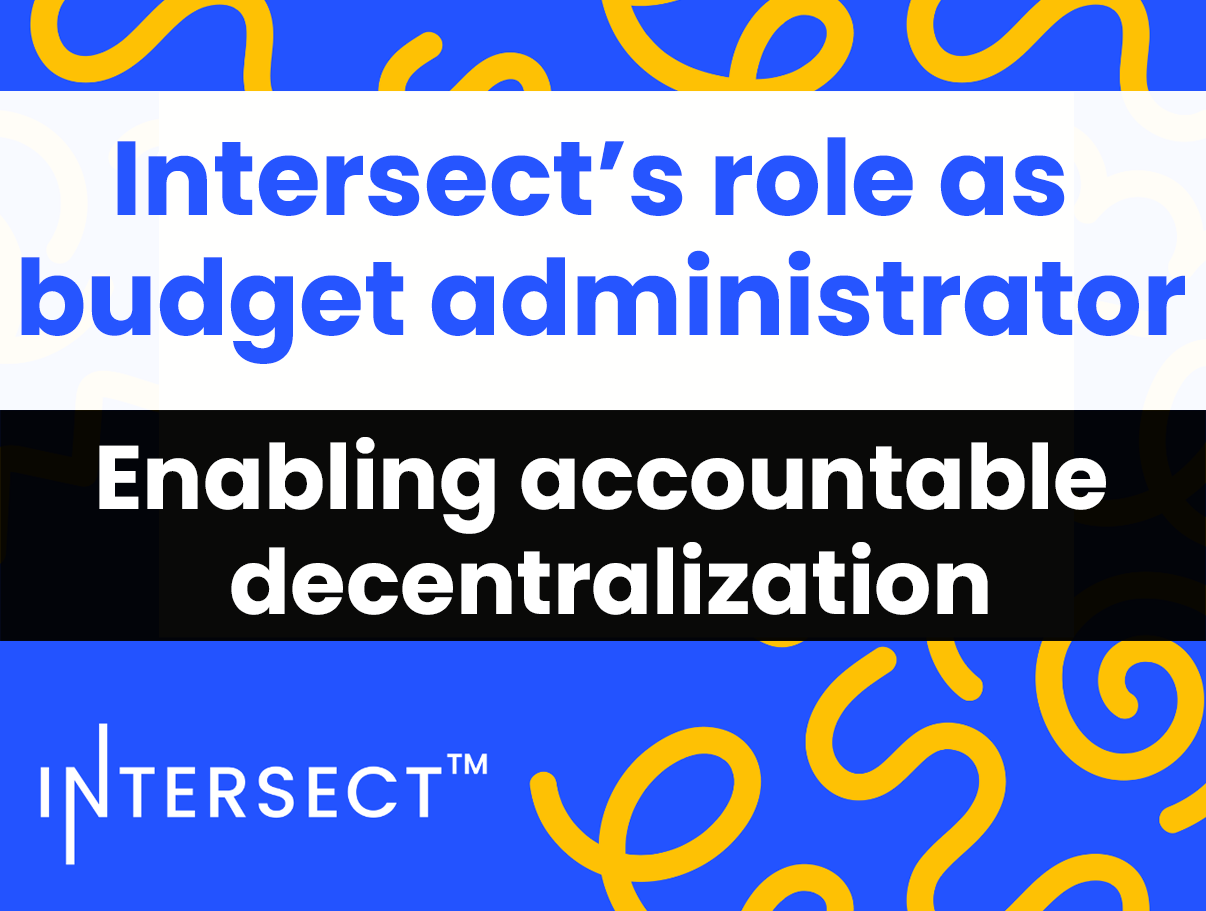Intersect’s role as budget administrator - enabling accountable decentralization

Following the implementation of CIP1694 at the Chang Upgrade, Cardano has entered a new era of decentralized governance, accompanied by a new level of responsibility. At the heart of this shift is the Cardano treasury, a shared resource intended to fund community-driven development, innovation, and stewardship. But managing public funds at scale in a decentralized ecosystem presents a complex challenge: how do we ensure transparency, trust, and delivery without compromising openness?
Over the past 18 months, Intersect has assisted in and facilitated decentralized systems that underpin decentralized governance. The core parts of that all revolve around the Cardano Treasury and how ada holders can assign funding for the continued growth, maintenance, and development of Cardano.
As an administrator for Cardano, Intersect plays a critical role in turning approved governance decisions into real-world execution. This includes submitting and signing governance actions, overseeing contract delivery, and reporting progress to the Cardano ecosystem.
To support this responsibility, we’ve formalized a comprehensive framework of administration policies, published here, that detail how Intersect will manage this role on behalf of the community. You can also view a detailed FAQ on our knowledge base.
A framework for responsible administration
Intersect's administration policies are built around four core pillars, each designed to reinforce transparency, accountability, and delivery assurance across the treasury process.
1. Administration Financial Audit Policy
Purpose: To ensure funds are spent as approved and provide the community with apparent financial oversight.
This policy outlines three audit tiers based on risk and funding size:
- Tier 1: Small, low-risk entities
- Tier 2: Medium-sized organizations with moderate risk
- Tier 3: High-risk, large-scale proposals or those impacting critical infrastructure
All beneficiaries must cooperate with financial audits aligned to their tier and Statement of Work (SoW). As part of our role as an Administrator and fulfiling constitutional requirements, funds withdrawn from the Treasury must be kept initially in separate, auditable accounts and never used for staking or voting (set to auto-abstain). Intersect will also provide public-facing reports to demonstrate transparency in distribution and usage.
Key takeaway: Vendors are accountable for how ada is used post-distribution, and Intersect provides structured oversight to ensure proper governance of releasing payments based on milestones or contract terms.
2. Delivery Assurance & Best Practice Policy
Purpose: To ensure that deliverables are clearly defined, measurable, and independently verified.
This policy introduces:
- Milestone Acceptance Forms (MAFs), are required within 5 business days of milestone completion
- Clear acceptance criteria, focused on binary, outcome-driven results
- Third-party assurance wherever possible, where a capable, independent expert verifies each milestone
If milestones aren’t completed or justified properly, payments may be delayed or withheld. All MAFs will be made public to uphold transparency across the ecosystem.
Key takeaway: Delivery is not just expected, it’s verified and validated by independent assessors, with public visibility for the entire community.
3. Due Diligence Policy
Purpose: To reduce risk, prevent fraud, and ensure compliance with legal and regulatory obligations.
Intersect conducts Know Your Customer (KYC) and Know Your Business (KYB) checks through Sumsub, a third-party provider. Repeat screenings are performed annually, and beneficiaries are required to disclose all relevant information, including any perceived negative aspects of their condition. Intersect also ensures that beneficiaries are not registered in jurisdictions where crypto is prohibited.
Key takeaway: Treasury recipients must meet integrity standards to protect the community from fraud or regulatory non-compliance.
4. Technical Review Policy
Purpose: To ensure the safety, sustainability, and performance of deliverables that may impact core infrastructure.
Any work with the potential to affect Cardano’s core systems must undergo a third-party review or audit. These reviews assess:
- Security and functionality
- Performance and integration capability
- Alignment with ecosystem best practices such as the Cardano Engineering Handbook
All relevant tests and reviews must be agreed upon before any mainnet integrations take place. Due to the varying scope and timelines, vendors are responsible for the cost of technical audits and are a constitutional requirement if a change to the protocol is required.
Key takeaway: Security and sustainability are top priorities. Independent technical review protects the network and community from unintended harm.
Why this matters now
Intersect’s role as administrator is about more than operational oversight. It’s about building confidence in Cardano’s decentralized systems. As we prepare to submit the first treasury withdrawals since the Budget Info Action was passed, every process is being stress-tested and formalized, and now it is also made transparent to the public.
These policies reflect our commitment to open governance and transparency. By setting clear expectations for treasury recipients and establishing structured, auditable processes, Intersect helps ensure that treasury funding yields tangible, measurable results that benefit the Cardano ecosystem.
Treasury withdrawals are the next step!
Following the continued advancement of the smart contract framework, we’re now completing the final configurations to be ready to submit Treasury Withdrawal Actions. This work is ongoing and subject to changes, however we now anticipate that actions will be submitted by epoch 568-9, with the intention of submitting all 39 at the same time.
Have any questions?
For a deeper dive into what each of these policies means in practice, including audit tiers, milestone expectations, due diligence requirements, and technical review standards, we’ve published a detailed FAQ in our Knowledge Base.
To learn more about Intersect’s work, explore our Knowledge Base, which provides detailed information on governance structures, committees, and funding. Additionally, visit the Intersect website for the latest news, updates, and roadmap information.